Archive
08 November 2024
Open Day of the Newly Upgraded INSYGHT Lab
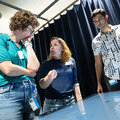
The INSYGHT lab at the Intelligent Systems (INSY) department has undergone a remarkable transformation, now boasting cutting-edge technology that includes multi-camera capture systems, advanced robotics, a robotic arm, audio synthesis capabilities, a sound-attenuated booth, and extended reality (XR) equipment. This state-of-the-art facility not only enhances multi-modal perception and generation but also fosters collaboration with the Social XR lab at the Centrum Wiskunde & Informatica (CWI), enabling seamless remote interactions between scientists and students from both institutions.
08 November 2024
Advancing AI Integration in the European Energy Sector

As the digital age transforms the energy landscape, artificial intelligence (AI) offers more and more solutions for enhancing efficiency, resilience, and sustainability. In collaboration with EPRI Europe, TU Delft is spearheading the AI-EFFECT project, which focuses on accelerating the development, testing, and validation of AI applications in the energy sector.
31 October 2024
9 researchers from ELLIS Unit Delft honoured with Fellows or Scholars title
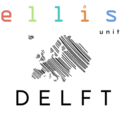
TU Delft has participated in ELLIS since 2019, currently with over 30 active members within the ELLIS Unit Delft. A total of nine researchers have recently been honour with an ELLIS Fellow or Scholar title.
31 October 2024
Bachelor students develop model to better understand the chemical process of renewable fuels
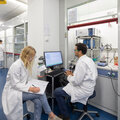
A group of TU Delft bachelor students has developed, as part of the students’ minor in Computational Science and Engineering, a new model that accurately predicts the molecular properties of alkanes. This knowledge is crucial for the development of renewable fuels.
23 October 2024
A map of the human brain and better math for curvature problems
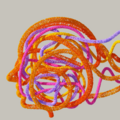
Knowing an environment and finding the best route: they are more important than you might think. They could give insight into more efficient logistics, and even advance complex health research. For example, a map of brain networks could help in understanding neurological disorders. And in the brain, as in many other structures across the sciences, there are complex mathematical curvatures to account for. To fund research in both domains the Dutch Research Council (NWO) awards a Vidi to Borbála Hunyadi and Richard Kraaij.
16 October 2024
TU Delft CTF 2024: Hundreds of Hackers Join Largest Dutch Cybersecurity Competition
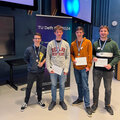
TU Delft's annual Capture The Flag (CTF) competition made history this year as the largest beginner-friendly hacking competition in the Netherlands. Bringing together hundreds of students, tech enthusiasts, and cybersecurity newcomers, the event featured a day packed with problem-solving, hacking, and learning on the TU Delft campus.
04 October 2024
PRIMA selected as candidate for NASA’s Probe mission
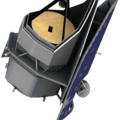
Out of the eight projects that competed to become NASA's Probe mission, only two remain. The Probe far-Infrared Mission for Astrophysics (PRIMA) and the Advanced X-ray Imaging Satellite (AXiS) have been selected for the second round. SRON delivers the detectors for PRIMA, developed together with TU Delft.
26 September 2024
National and International Phishing Attackers revealed

Phishing attacks, which trick users into sharing private data, have been a major online security threat for years. According to a 2023 FBI report, it is the top digital crime type. Researchers from the Intelligent Systems department have collaborated with three European country-code top-level domains (ccTLDs) to characterize phishing attacks, focusing on the Netherlands’ .nl, Belgium’s .be, and Ireland’s .ie. By understanding these patterns, the research aims to enhance security measures and protect internet users from phishing threats.
26 September 2024
11,000 young researchers have obtained a PhD from TU Delft
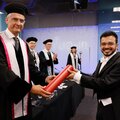
It was a very memorable day for PhD Amey Vasulkar last Thursday, the 19th of September. Not only did he successfully defend his promotion on Arctic Sea Ice in Tide Models, but he was also the 11,000th student to obtain a PhD from TU Delft. We are incredibly proud of and thankful for every single one of these 11,000 PhDs who started their scientific journey with us and continuously strive to change the world through their scientific innovations.
24 September 2024
Cutting-Edge Multi-Camera System for Multi-Modal Data Capture
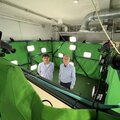
Researchers from the Intelligent Systems department have built an advanced multi-camera capture system designed for high-quality data collection from objects and people. By incorporating existing audio devices, this system enables the recording of multi-modal data from human social interactions including both video and audio, offering invaluable resources for understanding human behavior, modeling physical objects, and analyzing human-object interactions.
18 September 2024
A strong nose for trouble

Ammonia gas – it is both highly poisonous and corrosive, yet also often used in industry, or present around intensive livestock farming. To better mitigate the risks of ammonia leaks, Paddy French together with Lina Sarro and Sten Vollebregt will make smaller, more robust and eventually more affordable ammonia sensors. The NWO OTP programme has funded their research into a fully-integrated, single-chip sensor that incorporates two porous silicon carbide structures for detecting ammonia and humidity, all in a single layer and one etch step.
16 September 2024
Towards more efficient solar cells, with a lower carbon footprint
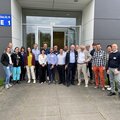
The SiLEAN project, funded by the European Union, has officially launched with the goal of setting a new benchmark in solar cell efficiency by over 25.5%, while reducing costs and lowering the carbon footprint by up to 75%.
16 September 2024
Unravelling how DNA is looped with DelftBlue and experiments
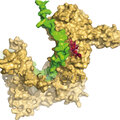
Proteins are the molecules that carry out essential functions in our cells, such as compacting long strands of DNA into a tiny structure in the cell nucleus. Experimental biophysicist Roman Barth wanted to understand this process down to the molecular level. Thanks to the DelftBlue supercomputer, he was able to compress several years of experiments into a single year.
27 August 2024
10 years of innovative maths education within TU Delft: congratulations PRIME!

Het PRogramme of Innovation in Mathematics Education (PRIME) is gericht op het herontwerpen van wiskundevakken voor ingenieurs. PRIME ging in 2014 van start, door middel van een pilot programma. PRIME is onderdeel van het Interfacultair Onderwijs vanuit de Department of Applied Mathematics (DIAM) bij TU Delft. Het programma maakt gebruik van een blended learning-cyclusontwerp om wiskunde te geven aan niet-wiskundestudenten binnen de gehele TU Delft.
15 August 2024
EEMCS bachelor student publishes paper in leading medical journal
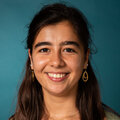
Ana van Lieshout Titan - prospective master's student in applied mathematics at the Faculty of EEMCS - wrote her bachelor thesis during an internship at the Harvard T.H. Chan School of Public Health. And her thesis has now resulted in a publication in the leading medical journal The Lancet Global Health. Ana developed mathematical models for the preventative treatment of tuberculosis among ex-prisoners in Brazil. It’s a tremendously special achievement that Ana has reached this milestone so early in her (scientific) career!
31 July 2024
Martin Skrodzki receives NWO grant for playful science communication project on AI awareness

Martin Skrodzki, from the Computer Graphics and Visualization group, has been awarded the NWO WECOM grant. The aim of this NWO programme is to fund science communication projects that promote the connection between science and society. The goal of Martin’s research project is to enable an AI-informed generation of tomorrow. He is creating an exhibition of four pop-up suitcases that teach the technical fundamentals of AI, and engage the general public in discussions about ethical issues surrounding AI.
29 July 2024
Honda Research Institute (HRI) Japan and EEMCS collaborate on human-centred computing for intelligent communication and social interaction
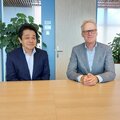
Scientists from TU Delft faculty of EEMCS and Honda Research Institute (HRI) in Japan are collaborating on developing a comprehensive AI system for human and group understanding. The project is focused on creating a generic AI system that uses nonverbal cues from human body poses, like hand gestures, eye gaze, facial expressions and speech, for various social interaction tasks. This AI system could make a significant impact on many real-world applications like industrial work, personal daily assistance, and healthcare, where intelligent agents are getting more common in recent years.
19 July 2024
Fourteen promising young Delft researchers receive Veni grant
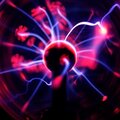
The Dutch Research Council (NWO) has awarded thirteen young TU Delft researchers from the Science (ENW) and Applied and Engineering Sciences (TTW) domains, a Veni grant of up to 320,000 euro.
08 July 2024
Can quantum computers solve an old riddle in composites design?
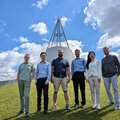
A team of researchers at TU Delft are the first in the world to apply quantum computing to solve an old riddle in the design of fibre-reinforced composite materials: how to determine the optimal sequence of angles at which the material’s layers are composed and stacked. This layering determines the mechanical properties of the material, essential for the application of composites for lightweight aircraft, wind turbine blades, cars or even batteries, etc. The QAIMS team have now gone through to the final rounds of the Airbus-BMW Quantum Computing Challenge where they will pitch their approach to ‘push the boundaries of quantum tech for mobility.’
02 July 2024
Making smart charging of electric vehicles even smarter

Electric cars are increasingly being charged 'smartly', which means they are only charged at times of high grid availability and low electricity prices. Smart charging prevents grid overload and saves you money. To get maximum benefit from smart charging, you not only want to reduce the charging speed at busy or expensive hours, but also be able to pause charging. Researchers from Utrecht University and TU Delft show that adding charging pauses doubles the effectiveness of smart charging. Most cars already support this, but some car models cannot handle these charging pauses properly. The researchers call on car manufacturers to ensure that all models can handle charge pauses. The standards for this already exist, but are sometimes not appropriately applied. Making technical smart-charging requirements mandatory could help.
20 June 2024
TU Delft team wins VU CTF
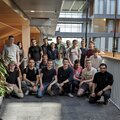
On the 18th of May 2024, six TU Delft student teams participated in the “VU CTF” hacking competition at the Vrije Universiteit Amsterdam. The TU Delft teams placed 1st, 2nd, 3rd, 5th, 9th, and 11th, winning the gold medal and dominating the leaderboard.
13 June 2024
Boosting the Cyber Security of European Power Grids
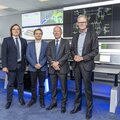
The increasing digitization of the power grid has brought about numerous benefits in sustainability, but it has also made the grid more susceptible to cyber threats. To address this challenge, the non-profit member organization dedicated to improving power grid security, ENCS, has joined forces with TU Delft's Control Room of the Future, signing a Memorandum of Understanding on June 12, 2024.
07 June 2024
Spring Symposium 2024 showcases AI education
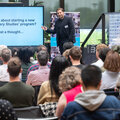
A line-up of interesting keynotes and workshops about AI Education captivated the audience on Tuesday June 4th during the fourth yearly Spring Symposium organised by TU Delft AI Initiative. From the fields of law and architecture to physics – a variety of disciplines were discussed, each showing how AI is a game changer for the future of their respective fields and the consequences this has for the education of the future. This underscores the importance of considering AI education across the whole university.
07 June 2024
A better understanding of emerging epidemics
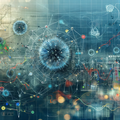
Researchers at TU Delft have discovered a groundbreaking way to better understand epidemics during their early onset - a critical period when every ounce of knowledge matters and can save lives. This innovative statistical method, which is up to twice as accurate as currently used epidemic models, has been published in the prestigious journal Proceedings of the National Academy of Sciences (PNAS) Nexus.
06 June 2024
Understanding Extreme Weather Phenomena: PHARA's 3D Radar Project's first official Summit
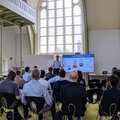
Under the name PHARA, a collaborative team of scientists and engineers aim to develop a pioneering phased array weather radar – first of its kind in Europe and one of the first worldwide. This joint effort TU Delft, TU Eindhoven, TNO, Robin Radar, Astron, KNMI, and the Rijksuniversiteit Groningen, officially kicked off with a summit held on May 30.
13 May 2024
Exposing children from neighbourhoods with socio-economic disadvantages to STEM education and vocational paths
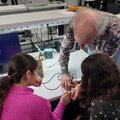
In a dynamic collaboration between academia and young minds, 12 enthusiastic children from a school in Delft recently embarked on an enriching journey into the Science, Technology, Engineering, and Mathematics (STEM). This event was part of the project “Bliksemstage” of JINC organisation.
03 May 2024
TU Delft team wins Challenge the Cyber 2024
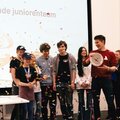
On the 20th of April 2024, TU Delft students participated in the national “Challenge The Cyber” hacking competition in Eindhoven, and TU Delft Computer Science students Azra Ocak, Iancu Popp, Ksawery Radziwiłowicz, and Per Schrijver won the first prize in the junior division!
29 April 2024
Gerhard Wellein visiting professor High Performance Computing

Prof. Dr. Gerhard Wellein has started as visiting professor in High Performance Computing at our faculty. Gerhard is a Professor for High Performance Computing (HPC) at the Department for Computer Science of the Friedrich-Alexander-Universität Erlangen-Nürnberg (FAU) in Germany. He will travel regularly to Delft, to share his knowledge on High Performance Computing with the HPC team at our faculty.
27 March 2024
The future of radar is distributed and inspired by biology

NWO has funded an ambitious new line of research led by Francesco Fioranelli – Associate Professor in the Microwave Sensing, Signals and Systems (MS3) group – focusing on the development of distributed radar systems. This technology is poised to redefine the limits of conventional radar by offering much improved flexibility and adaptability. The approach centers on transitioning away from singular and static radar installations towards spatially distributed network of radar nodes. These distributed radar systems could be capable of interpreting complex human movements and vital signs, as well as identifying and classifying dense clusters or swarms of drones.
15 March 2024
Two EEMCS researchers nominated for Best Climate Action & Energy Paper

Increasingly extreme weather conditions and a steadily rising sea level are unmistakable signs of the deepening climate crisis. Climate action and an accelerated energy transition can make a difference, with a crucial role for technology and engineering – and thereby for the thousands of students, PhDs, and postdocs of TU Delft. A total of nine TU Delft researchers are in the running for the Best Climate and Energy Paper of 2023, including two from the Faculty of Electrical Engineering, Mathematics and Computer Science (EEMCS). Two winners will be announced on Tuesday, 19 March.
16 February 2024
Siemens CEO explores Control Room of the Future at EEMCS
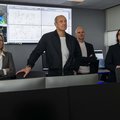
On Thursday February 15, President and CEO of Siemens AG Roland Busch visited the Control Room of the Future (CRoF) Technology Centre, showcasing the shared ambitions of Siemens and TU Delft to explore the frontiers of energy management innovation. TU Delft's CRoF, led by Assistant Professor Alex Stefanov, is a Technology Centre aimed at making the future power grid intelligent, digitally resilient and cyber secure.
15 February 2024
Five grants awarded to EEMCS projects by Open Education Stimulation Fund
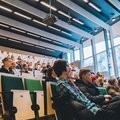
The Open Education Stimulation Fund (OESF) 2023 has awarded grants to 5 project proposals by EEMCS educators and researchers. A total of 13 TU Delft proposals have received the grant. The OESF encourages TU Delft staff to innovate their teaching with open educational resources and open practices.
13 February 2024
Cynthia Liem Receives Women in AI Netherlands Diversity Leader Award
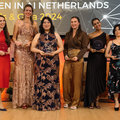
Cynthia Liem, associate professor of the Intelligent Systems department, has been recognised with the 2024 Women in AI Netherlands Diversity Leader Award. This highlights her contributions to enhancing diversity, equity, and inclusivity within the artificial intelligence (AI) sector.
02 February 2024
TU Delft, Maastricht University, dsm-firmenich and Kickstart AI launch new ICAI lab: GENIUS
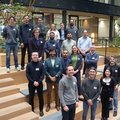
The start of 2024 has brought a new ICAI lab as part of the ROBUST program: GENIUS (Generative Enhanced Next-Generation Intelligent Understanding Systems). The GENIUS lab seeks to extend and enhance generative AI methods to support human experts in answering scientific and operational questions, through collaborative semantic knowledge engineering between people and AI systems. The GENIUS lab is a collaboration between Delft University of Technology, Maastricht University, dsm-firmenich, and Kickstart AI, and an NWO Long-Term Programme initiated by the Innovation Centre for Artificial Intelligence (ICAI).
25 January 2024
Fujitsu and Delft University of Technology establish new quantum lab
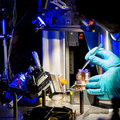
Fujitsu and Delft University of Technology today announced the establishment of the Fujitsu Advanced Computing Lab Delft at Delft University of Technology, an industry-academia collaboration hub dedicated to the development of quantum computing technologies. The new collaboration hub will be positioned as part of the Fujitsu Small Research Lab initiative, which dispatches Fujitsu researchers to technology incubators at leading global universities to conduct joint research with some of the top researchers in their fields, including professors as well as the next generation of innovators.
22 December 2023
Andy Zaidman new chair of Software Technology

Starting January 1st, Andy Zaidman will assume the role of chair of the Software Technology (ST) department at the Faculty of Electrical Engineering, Mathematics, and Computer Science (EEMCS) of TU Delft. Zaidman succeeds Arie van Deursen, who has successfully worked on the positioning and growth of the department over the past eight years.
04 December 2023
Global telecommunications with lasers
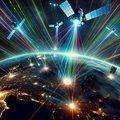
Lasers communicating from the earth with satellites in the atmosphere: it sounds far-fetched, but it could be a valuable improvement towards connecting remote parts of the world to the internet. TU Delft has raised funding through the Open Technology Programme from the NWO's Applied and Technical Sciences domain to further explore the potential of this innovation.
29 November 2023
Symposium on von Neumann: perhaps the greatest mathematician in modern history
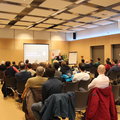
John von Neumann (1903-1957) was a Hungarian-American mathematician who made essential contributions not only in mathematics but also in physics, computer science and economics. In many ways he shaped the future we live in. The Embassy of Hungary in the Netherlands, in cooperation with Júlia Komjathy of the EEMCS faculty, organised a symposium commemorating the remarkable legacy of one of the greatest - but relatively unknown - mathematicians in modern history.
14 November 2023
The Delft Satellite Delfi-C3 Has Come to Its End
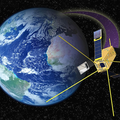
Last night, probably between 21:00 and 22:00 CET, the nanosatellite Delfi-C3 reached the end of its life at the age of 15. The Delfi-C3, the first satellite built by students, burned up in the atmosphere. In 2006, the small satellite was built by scientists from TU Delft, along with a group of about 60 students. It was launched from India in 2008. Since then, it has orbited the Earth more than 85,000 times, traveling approximately 3.7 billion kilometers.
09 November 2023
Four leading EEMCS researchers receive prestigious NAE fellow appointment

Four researchers from the Faculty of Electrical Engineering, Mathematics and Computer Science (EWI) have been named leading experts and are appointed as fellows by the Netherlands Academy of Engineering (NAE). A total of 62 fellows have been appointed, originating from the fields of technological sciences, applied research and innovation. The fellows focus on fostering an innovation climate that generates societal and economic value by providing engineering-based solutions to major societal issues while offering new business and export opportunities.